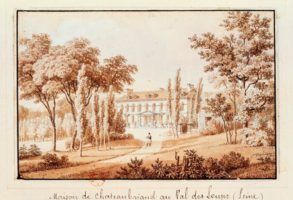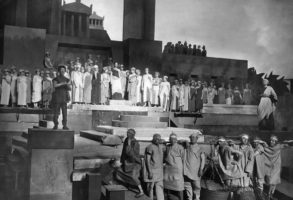Published April 1, 2019
The New Atlantis - Winter 2019 issue
What trace of his earthly passage can a man of genius hope will remain after his death? For a great scientist, it is almost certainly a discovery that advances human understanding a step further from ignorance and confusion. To uncover some eternal truth that has been carefully concealed from ordinary sight by Nature or whatever gods there be, and to enjoy the lasting esteem accorded the world-altering thinkers — these are the motive forces behind the most serious and accomplished scientific lives. To one who opens new mental continents for further exploration, and exploitation, the supreme accolades rightly belong. Honor of this order is not a paltry thing.
Yet John Milton called the craving for fame “that last infirmity of noble mind”; and while such infirmity might easily be forgiven poets, who are notorious for their moral weakness, we have become accustomed to thinking of scientists as free of such all-too-human frailties. Like Aristotle’s theoretical man in the Nicomachean Ethics, scientists are said to live for the unsurpassed pleasure of knowing the highest things in the universe, those that cannot be other than they are. This makes them god-like, so that they need nothing else — certainly not the glint of admiration or envy in other men’s eyes.
And yet perfection is not to be expected even from the most high-minded among us. The man who loves knowing alone is a creature of fantasy, a chimera, an impossibility. He is bound to have other, competing loves, which adulterate the loftiest vocation, however dedicated to it he might be. He will love his wife and children, his country, his reputation. One hesitates even to call these lesser loves, let alone infidelities; most people value them above the work they happen to do to earn their living, and indeed to consider your job more important than your family will rightly mark you to your fellows as a sorry excuse for a human being.
But of course there are jobs and then there are callings, as there is the democratic understanding of life’s responsibilities and there is the noble understanding of one’s appointed task. When one has a true vocation, to fall short of its demands is unacceptable, even though it is unavoidable. The honest man punishes himself for such failures. His own standards are the law he obeys, and his conscience is the most exacting judge of his integrity. But if one happens to be a theoretical man yet also a man of honor, who needs the good opinion others have of him, a complication enters the picture. Then the most painful failure offends against those standards of one’s own as well as against the public’s sense of right and wrong. In that case it is exceedingly hard to remain an honest man; the temptation to lie both to yourself and to the populace is overwhelming, and it is deadly.
The physicist Werner Heisenberg (1901–1976) won himself a lasting name with a world-altering discovery so startling and influential that it has leaked into popular culture — albeit in a misconceived, bastardized form. Heisenberg’s uncertainty principle is a pillar of quantum physics, and represents the titanic straining of human intelligence to explain phenomena that we really don’t have words to describe. Heisenberg’s achievement rivals Einstein’s — although Einstein found the uncertainty principle to be worse than dubious, a gross violation of the cardinal rules governing scientific truth and an offense against God Himself. Yet for Heisenberg, as he said in Physics and Philosophy (1958), quantum theory — along with Newtonian mechanics, thermodynamics, and electrodynamics and special relativity — is one of the four conceptual systems of physics “that have already attained their final form.”
Great honor is due such masterly theoreticians. But of course both Einstein’s and Heisenberg’s theories laid the groundwork for the most terrible weapons ever devised, and many have not forgiven the minds that opened the prospect of man-made Armageddon. Einstein in his innocence was disagreeably surprised when more worldly colleagues told him that such a thing as an atomic bomb was possible. No longer quite so innocent, Einstein wrote to President Roosevelt telling him of this possibility, and warning him that the Germans may already be working toward realizing it. The less-innocent Heisenberg was enlisted in the Nazi effort to build an atomic bomb, and his was the most formidable, and the most feared, intelligence to work on that project.
How Heisenberg came to terms with Hitler’s regime, why he served its mania for annihilation when he had ample opportunity to find refuge in the civilized world, are questions that bedevil his reputation. The regard he showed for what he peculiarly called his “honor” when he was savaged in the Nazi press as a “white Jew” presents further matter for the inquiring moralist. And what he actually did to help or to hinder the bomb project remains the most vexed question there is for his biographers, not to say for the whole history of twentieth-century science. That Heisenberg’s own accounts of his motives and actions spray in all directions does not make the historian’s task an easy one. And the fierce emotions that attach to the memory of Nazi war-making inevitably color the search for the truth, which is not to say that hot feeling is necessarily an unreliable moral guide here.
The controversy surrounding Heisenberg’s wartime role has been of sufficient public interest that it even begat a Tony Award–winning play, Michael Frayn’s Copenhagen (1998). Publicity of this kind is not exactly the vessel of remembrance in which Heisenberg would have wished his reputation to be preserved. To be honored as the discoverer of the uncertainty principle would have been quite enough. But history made other plans for Heisenberg, and placed him in the defendant’s dock, along with a multitude of his countrymen — where he does stand out among them, both for his intellect and the potential murderousness of his task.
One must say that he chose his fate, more freely and thoughtfully than many others who served Hitler’s evil intent. Thus, a scientific career that would have been the object of awed — if largely uncomprehending — praise has become instead the subject of moral judgment. Ordinary men and women who would be utterly dumbfounded by the mathematical arcana of Heisenberg’s signature matrix mechanics now deliberate the question of what kind of man he really was. And that question is an eminently fair one for ordinary people to ask.
Click here to read the rest of this article at TheNewAtlantis.com.
Algis Valiunas is a New Atlantis contributing editor and a fellow at the Ethics and Public Policy Center.





